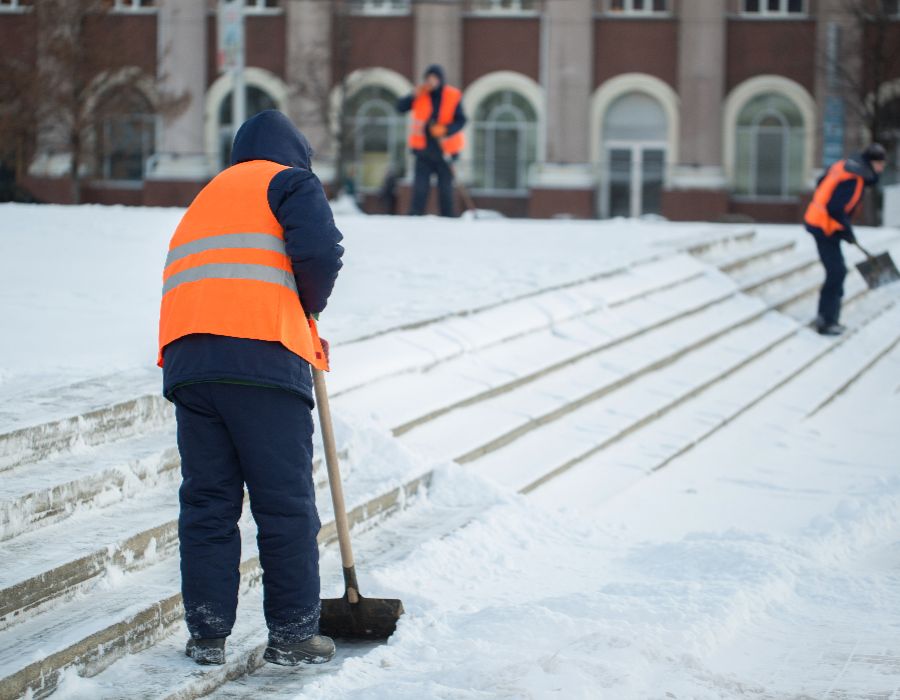Table of Contents
Related Articles
Essential Safety Tips for Outdoor Work & Maintenance For ISCC Members In Massachusetts

Spring is a busy season for the ISCC membership—independent schools and cultural institutions across Massachusetts—as they prepare outdoor spaces for learning, recreation, and cultural enjoyment. Whether it’s maintaining sports fields and playgrounds at schools or tending to gardens and historical sites at cultural institutions, outdoor work is vital to keeping these spaces safe and inviting. However, the unpredictable Massachusetts spring weather and increased activity bring unique safety challenges. This blog offers essential safety tips tailored for ISCC members, ensuring staff, students, volunteers, and visitors thrive in secure environments.
1. Wear Appropriate Clothing For Outdoor Work
Proper attire is critical for anyone involved in outdoor maintenance at independent schools and cultural institutions, including staff, volunteers, and even students assisting with tasks.
- Long pants and sleeves shield against sunburn, insects, and scratches from plants or equipment.
- Sturdy, closed-toe footwear with good grip prevents slips on wet grass, uneven paths, or historical grounds.
- Wide-brimmed hats protect against UV rays during extended outdoor projects.
- Gloves and safety goggles are essential when handling tools or chemicals near classrooms or exhibits.
For schools, clothing should align with dress codes while prioritizing safety. Cultural institutions may need to equip volunteers with gear suited for preserving delicate artifacts or structures during maintenance.
2. Use The Right Tools For The Job
Using and maintaining appropriate tools is key to avoiding accidents, especially when volunteers or students at ISCC member institutions lend a hand.
- Check tools for wear before use—broken or dull equipment can cause injuries on sports fields or in sculpture gardens.
- Match tools to tasks, like using specialized pruning tools for landscaping rather than generic alternatives.
- Train all users, particularly on power tools, and restrict access to trained personnel only.
- Lock tools away when not in use to prevent unauthorized handling, a must in settings with children or visitors.
This ensures safety and efficiency across Massachusetts school grounds and cultural sites.
3. Stay Hydrated During Outdoor Maintenance
With spring temperatures climbing, dehydration is a risk during outdoor work or events hosted by ISCC members.
- Take water breaks often—aim for 8 ounces every half hour during physical tasks like playground repairs or garden upkeep.
- Offer shaded rest spots for staff and students during outdoor classes or volunteers at cultural events.
- Provide water access, such as stations or reusable bottles, especially for school field days or public exhibitions.
Hydration keeps everyone safe and energized, from maintenance crews to participants in outdoor activities.
4. Be Aware Of Weather Conditions
Massachusetts spring weather can shift quickly, impacting outdoor work and events at ISCC schools and cultural institutions.
- Monitor forecasts daily and reschedule tasks or activities if storms or high winds are predicted.
- Wear layered clothing in breathable fabrics to adapt to temperature swings.
- Keep rain gear handy for sudden showers, ensuring staff and volunteers stay dry and comfortable.
- Plan backups for outdoor lessons or exhibitions to avoid disruptions from unexpected weather.
Proactive weather awareness protects people and preserves schedules at ISCC member sites.
5. Ensure Safety Around Students & Visitors
ISCC members must safeguard students at schools and visitors at cultural institutions during outdoor maintenance.
- Supervise students during activities near work zones, setting clear boundaries to avoid hazards.
- Time maintenance wisely, opting for off-hours to minimize exposure to ongoing tasks.
- Use signs or barriers to warn of work areas, keeping visitors safe around gardens or historical displays.
- Handle chemicals carefully, storing and applying them far from play areas or public spaces.
These steps maintain a secure environment for all who use ISCC member facilities.
For ISCC members, spring outdoor work is essential but demands a focus on safety. By wearing proper clothing, using the right tools, staying hydrated, monitoring weather, and protecting students and visitors, your institution can ensure a safe and successful season. These tailored tips help create spaces where learning and cultural appreciation flourish without risk. For more safety guidance, connect with ISCC resources or contact us for more information.




